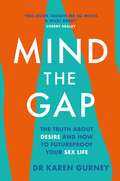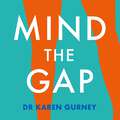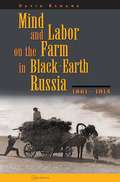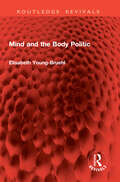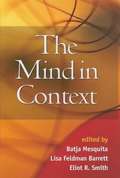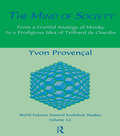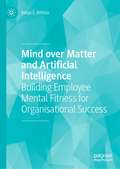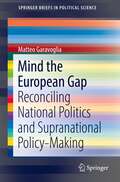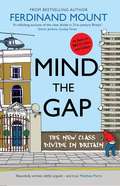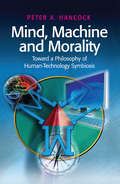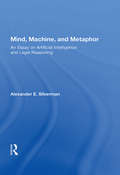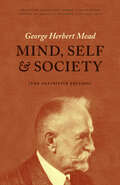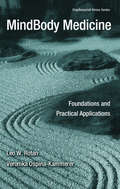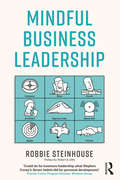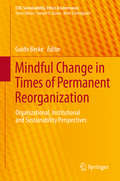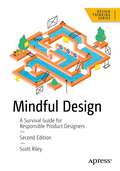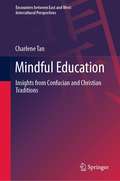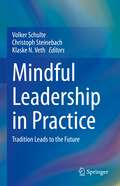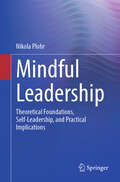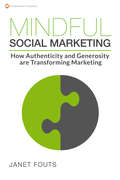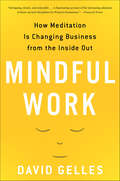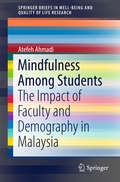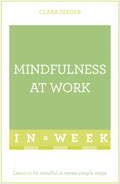- Table View
- List View
Mind The Gap: The truth about desire and how to futureproof your sex life
by Dr Karen Gurney'This book taught me so much about female desire. A must read!' Cherry HealeyDid you know that there is an orgasm gap of around 30% between heterosexual couples when they have sex? In Mind The Gap, Dr Karen Gurney, a clinical psychologist and certified psychosexologist, explores not just this gap, but the gaps in our knowledge of so much of the most important new science around sex and desire. In this book, you will learn that nearly everything that you've been led to believe about female sexuality isn't actually true. And that, despite what you might think, it is possible to simultaneously feel little to no spontaneous desire and have a happy and mutually satisfying sex life long term.Exploring the mismatch between ideas about sex in our society and what the science tells us, Mind The Gap also explains how this disconnect lies at the root of many of our sexual problems. Combining science with case studies, practical exercises and tips, this is a book for anyone who wants to better understand the mechanics of desire and futureproof their sex life, for life.
Mind The Gap: The truth about desire and how to futureproof your sex life
by Dr Karen Gurney'This book taught me so much about female desire. A must read!' Cherry HealeyDid you know that there is an orgasm gap of around 30% between heterosexual couples when they have sex? In Mind The Gap, Dr Karen Gurney, a clinical psychologist and certified psychosexologist, explores not just this gap, but the gaps in our knowledge of so much of the most important new science around sex and desire. In this book, you will learn that nearly everything that you've been led to believe about female sexuality isn't actually true. And that, despite what you might think, it is possible to simultaneously feel little to no spontaneous desire and have a happy and mutually satisfying sex life long term.Exploring the mismatch between ideas about sex in our society and what the science tells us, Mind The Gap also explains how this disconnect lies at the root of many of our sexual problems. Combining science with case studies, practical exercises and tips, this is a book for anyone who wants to better understand the mechanics of desire and futureproof their sex life, for life.
Mind The Gap: The truth about desire and how to futureproof your sex life
by Dr Karen GurneyDid you know that there is an orgasm gap of around 30% between heterosexual couples when they have sex? In Mind The Gap, Dr Karen Gurney, a clinical psychologist and certified psychosexologist, explores not just this gap, but the gaps in our knowledge of so much of the most important new science around sex and desire. In this audiobook, you will learn that nearly everything that you've been led to believe about female sexuality isn't actually true. And that, despite what you might think, it is possible to simultaneously feel little to no spontaneous desire and have a happy and mutually satisfying sex life long term.Exploring the mismatch between ideas about sex in our society and what the science tells us, Mind The Gap also explains how this disconnect lies at the root of many of our sexual problems. Combining science with case studies, practical exercises and tips, this is an audiobook for anyone who wants to better understand the mechanics of desire and futureproof their sex life, for life.(P)2020 Headline Publishing Group Ltd
Mind and Labor on the Farm in Black-Earth Russia 1861-1914
by David KeransThis text endeavours to recast our understanding of the agrarian problem by uncovering the history of both the physical and mental dimensions of agriculture. Employing literary, agronomic and statistical information on peasant labour and culture, this book also offers new perspectives on the limitations of traditional agriculture to adapt to a rapidly changing economic geography, such as that of late nineteenth and early twentieth century Russia. By taking a ground level view of the evolution of Russian agricultural technique, the author arrives at a very different understanding of the agrarian problem. The book identifies both the achievements and limitations of peasant farmers in adapting farming practices to the economic and technological challenges of the half century preceding the revolution. Most importantly, the book delves deeply into peasant life and culture to demonstrate how and why farming improvements did not pass determinable levels.
Mind and the Body Politic (Routledge Revivals)
by Elisabeth Young-BruehlFirst published in 1989, Mind and the Body Politic is a collection of Elisabeth Young-Bruehl’s twelve essays and lectures on political theory, psychoanalysis, feminism, and the theory of biography. It is a must read for students and researchers of political philosophy, psychology, and sociology.
Mind in Context
by Lisa Barrett Batja MesquitaMost psychology research still assumes that mental processes are internal to the person, waiting to be expressed or activated. This compelling book illustrates that a new paradigm is forming in which contextual factors are considered central to the workings of the mind. Leading experts explore how psychological processes emerge from the transactions of individuals with their physical, social, and cultural environments. The volume showcases cutting-edge research on the contextual nature of such phenomena as gene expression, brain networks, the regulation of hormones, perception, cognition, personality, knowing, learning, and emotion.
Mind of Society
by ProvencalFirst Published in 1999. Routledge is an imprint of Taylor & Francis, an informa company.
Mind over Matter and Artificial Intelligence: Building Employee Mental Fitness for Organisational Success
by Vidya S. AthotaThis book explores mind over matter in a digital age and presents the importance of continued transformation of the mind to promote humane Artificial Intelligence for greater good. In doing so, it focuses on the organizational and managerial practices that are critical in creating an environment that supports mindset and organizational growth. The digital age is significantly impacting employees and organizations and steering billions of people around the world. Artificial Intelligence has created a whole new paradigm with a revolution loftier than all the industrial revolutions and the innovations of the past millennia combined. We are either headed towards restoring humanity back to the “Imago Dei”, where creative powers are unleashed in human freedom, or advocating selective breeding and “survival of the fittest”.
Mind the European Gap: Reconciling National Politics and Supranational Policy-Making (SpringerBriefs in Political Science)
by Matteo GaravogliaThis book presents a number of specific proposals that, if translated into political reality, could contribute to nurturing a Europeanisation of national public spheres. Having left Brexit behind, intellectuals and policy-makers throughout Europe are now passionately discussing how to move forward the process of European integration. Crucial to this effort is the debate about the Europeanisation of national public spheres: a process that should not harm existing national and local identities but, rather, contribute to their enrichment. This book addresses policy-makers, academics, and forward-thinking citizens alike by providing them with a variety of ideas - and the practical steps needed to translate these into reality across selected European countries - to begin narrowing a dangerous gap between national politics and supranational policy-making.
Mind the Gap: The New Class Divide In Britain
by Ferdinand MountThrough acute observation and vivid illustration - drawing on every aspect of life from soap operas, speech patterns and gardening to education and the distribution of wealth - he demolishes the illusion that we live in a classless society and shows how the worst-off in Britain today are more culturally deprived than their parents or grandparents. The author's solutions, like his explanations of what has gone wrong, are original, surprising and unsparing to intellectuals and politicians of all parties.
Mind, Machine and Morality: Toward a Philosophy of Human-Technology Symbiosis
by Peter A. HancockTechnology is our conduit of power. In our modern world, technology is the gatekeeper deciding who shall have and who shall have not. Either technology works for you or you work for technology. It shapes the human race just as much as we shape it. But where is this symbiosis going? Who provides the directions, the intentions, the goals of this human-machine partnership? Such decisions do not derive from the creators of technology who are enmeshed in their individual innovations. They neither come from our social leaders who possess only sufficient technical understanding to react to innovations, not to anticipate or direct their progress. Neither is there evidence of some omnipotent 'invisible hand,' the simple fact is that no one is directing this enterprise. In Mind, Machine and Morality, Peter Hancock asks questions about this insensate progress and has the temerity to suggest some cognate answers. He argues for the unbreakable symbiosis of purpose and process, and examines the dangerous possibilities that emerge when science and purpose meet. Historically, this work is a modern-day child of Bacon's hope for the 'Great Instauration.' However, unlike its forebear, the focus here is on human-machine systems. The emphasis centers on the conception that the active, extensive face of modern philosophy is technology. Whatever we are to become is bound up not only in our biology but critically in our technology also. And to achieve rational progress we need to articulate manifest purpose. This book is one step along the purposive road. Drawing together his many seminal writings on human-machine interaction and adapting these works specifically for this collection, Peter Hancock provides real food for thought, delighting readers with his unique philosophical perspective and outstanding insights. This is theoretical work of the highest order and will open minds accordingly.
Mind, Machine, And Metaphor: An Essay On Artificial Intelligence And Legal Reasoning
by Alexander E. SilvermanMind, Machine, and Metaphor is a rich, original, and wide-ranging view of legal theory in the context of artificial intelligence (AI) research. It is essential reading for legal theorists and for legal scholars and students of AI with an interest in each other's fields.
Mind, Self & Society: The Definitive Edition
by Hans Joas George Herbert Mead edited by Charles W. Morris annotated by Daniel R. HuebnerGeorge Herbert Mead is widely recognized as one of the most brilliantly original American pragmatists. Although he had a profound influence on the development of social philosophy, he published no books in his lifetime. This makes the lectures collected in Mind, Self, and Society all the more remarkable, as they offer a rare synthesis of his ideas. This collection gets to the heart of Mead’s meditations on social psychology and social philosophy. Its penetrating, conversational tone transports the reader directly into Mead’s classroom as he teases out the genesis of the self and the nature of the mind. The book captures his wry humor and shrewd reasoning, showing a man comfortable quoting Aristotle alongside Alice in Wonderland. Included in this edition are an insightful foreword from leading Mead scholar Hans Joas, a revealing set of textual notes by Dan Huebner that detail the text’s origins, and a comprehensive bibliography of Mead’s other published writings. While Mead’s lectures inspired hundreds of students, much of his brilliance has been lost to time. This new edition ensures that Mead’s ideas will carry on, inspiring a new generation of thinkers.
MindBody Medicine: Foundations and Practical Applications (Psychosocial Stress Series)
by Leo W. Rotan Veronika Ospina-KammererMindBody Medicine encapsulates a variety of interventions designed to change, strengthen, or enhance a patient’s thoughts, emotions, and behaviors in order to promote improved health and wellness. There has been a growing trend among professionals in the health care fields to better understand the mind-body connection. How do the body and mind interact and, more specifically, how can we use the energy of the mind to heal the body? Leo Rotan and Veronika Ospina-Kammerer have sifted through already existing works on this topic and compiled a comprehensive overview of this expanding field of study. As a result, MindBody Medicine provides students and practitioners in a range of health care professions with a guide to more fully understand the relationship between body and mind.
Mindful Business Leadership
by Robbie SteinhouseMindful Business Leadership presents a new model of leadership. It introduces ten very different leadership roles that are required to meet the challenges of modern business. Memorable metaphors and images are created for each, and they are placed in a matrix. Readers are shown how to develop these roles within themselves. Potentially negative aspects of each are discussed, along with material on how to put these to creative use. The book argues that mindfulness is the best way to balance the roles – a mindful leader will know ‘who to be’ in any situation. The last part is taken up with clear, practical exercises that readers can practice to become more fully mindful and develop a clear vision for their own leadership. Mindful Business Leadership is relevant to anyone, anywhere in the world, who is moving (or wishes to move) to a position of leadership.
Mindful Change in Times of Permanent Reorganization
by Guido BeckeSince the 1990ies, organizations from different sectors have been operating in increasingly dynamic socio-economic environments characterized by unexpected events and instability. Organizations tend to adjust to dynamic environments by change initiatives promoting permanent reorganization. Such change initiatives often induce unintended effects, e. g. an erosion of trust, the violation of 'psychological contracts' in employees' eyes or a decrease in organizational effectiveness. This book explores and analyzes whether such unintended effects can be anticipated or constructively dealt with by mindful change. The latter refers to the concept of organizational mindfulness that originally is linked to risk and safety research, e. g. in respect to 'High Reliability Organizations'. In this book, organizational mindfulness is re-conceptualized addressing organizational change in the perspective of organizational sustainability. Moreover, it is explored how institutions foster or restrict organizations' capability of organizational mindfulness in change processes.
Mindful Design: A Survival Guide for Responsible Product Designers (Design Thinking)
by Scott RileyLearn to create seamless designs backed by a responsible understanding of the human mind. This new edition is fully updated and reworked to employ a realistic, challenging, and practical approach to interface design, presenting state of the art scientific studies in behavioral sciences, interface design and the psychology of design. All with modern, up-to-date examples and screenshots. The practical portion of this edition has been completely reworked, giving you the chance to follow along with a real, proven design process that has produced several successful products imbued with the principles of mindful, responsible design.You'll examine how human behavior can be used to integrate your product design into lifestyle, rather than interrupt it, and make decisions for the good of those that are using your product. You will also learn about the neurological aspects and limitations of human vision and perception; about our attachment to harmony and dissonance; and about our brain’s propensity towards pattern recognition and how we perceive the world around us. In the second half of the book, you’ll follow along with the key phases of a design project, implementing what you have learned in an end-to-end, practical setting. Design is a responsibility, but not enough designers understand the human mind or the process of thought. Mindful Design, Second Edition introduces the areas of brain science that matter to designers, and passionately explains how those areas affect each human’s day-to-day experiences with products and interfaces, providing a battle-tested toolkit to help you make responsible design decisions. What You'll Learn Review how attention and distraction work and the cost of attentional switchingUse Gestalt principles to communicate visual groupingEnsure your underlying models make sense to your audienceUse time, progression, and transition to create a compositionCarefully examine controlling behavior through reductionist and behaviorist motivation concepts Apply the theoretical knowledge to practical, mindful interface design Who This Book Is For The primary audience for this book is professional designers who wish to learn more about the human mind and how to apply that to their work. The book is also useful for design-focused product owners and startup founders who wish to apply ethical thinking to a team, or when bootstrapping their products. The secondary audience is design students who are either studying a ‘traditional’ visual design course, or a UX/interaction design course who have a desire to learn how they might be able to apply mindful design to their early careers. Finally, a tertiary audience for this book would be tutors involved in teaching design, or peripheral, courses who may wish to incorporate its teachings into their lectures, workshops or seminars.
Mindful Education: Insights from Confucian and Christian Traditions (Encounters between East and West)
by Charlene TanThis book provides original ideas and practical recommendations for educators in a post-pandemic world. We live in a world that has been upended by the COVID-19 pandemic. Students around the globe have been besieged by disruptions that threaten not only their academic learning but also their mental, emotional, and interpersonal well-being. In the midst of pressing and mounting challenges, how can schools ensure the total wellness of all their students? Beyond reactive, piecemeal, and short-term measures, how can schools enact mindful education that pays attention to wholeness in every student? Extending the current research on well-being and mindfulness, this book draws insights from Confucian and Christian traditions. These two traditions have been selected as they are widely seen to represent, and have impacted, Eastern and Western civilisations respectively for millennia. Informed and inspired by Confucian and Christian perspectives, this book proposes that mindfulness is an orientation towards wholeness, where one experiences he (harmony) and shalom (peace). Mindful education is realised through: A school community of ren (humanity) and agape (love); A transforming curriculum that centres on dao (way) and imago dei (god’s image); Empathic teachers who are motivated by shu (putting oneself in the other’s place) and the Golden Rule (do to others as you would have them do to you); and Self-directed learners who develop themselves through xiuji (self-cultivation) and spiritual disciplines. Applying ancient wisdom to contemporary settings, this book on promoting student well-being through mindful education is a useful resource for policymakers, educators, researchers, and general readers.
Mindful Leadership in Practice: Tradition Leads to the Future
by Christoph Steinebach Volker Schulte Klaske N. VethThis book shows why mindful leadership is the key element for supportive management and leadership in the 21st century. It highlights the fundamentals of mindful leadership in philosophy and history in different cultural traditions and shows latest research on mindfulness and digitalization, technology, social networking, and leading-self concepts. The book bridges the past and the future. By combining a range of research perspectives, it connects mindfulness to serving leadership concepts and describes resilience for both individuals and organizations. In addition, it presents theoretical aspects and practical recommendations on how to implement mindful leadership and supportive environments in organizational cultures. The book encompasses history, present leadership challenges and future management perspectives and enables the implementation of models of good practice into daily working life. It includes contributions from researchers of different continents, and offers an international overview of state-of-the art leadership research.This book is of interest to professionals and researchers working on leadership, from the perspective of positive psychology, organizational studies, and wellbeing studies.
Mindful Leadership: Theoretical Foundations, Self-Leadership and Practical Implications
by Nikola PlohrThis book invites readers into a thought-provoking dialogue, fostering reflection and self-discovery. It offers a process designed for anyone eager to explore their inner world and personal patterns while remaining open to new perspectives in their interactions with others. Moving fluidly from introspection to action, it bridges theory with practice in a meaningful way. The first section, Inner Leadership, explores the rich possibilities of self-reflection, an essential element for contemporary leadership. Mindfulness, both as a practice and a concept, provides the space for inward exploration—helping us connect with our inner narratives, our unique responses to criticism and emotions, and the ongoing search for recognition. The second section shifts the focus to leadership within teams. Through the lens of Mindful Leadership, it delves into the complex web of interpersonal dynamics that shape not only our professional lives but our broader human relationships. Key themes include communication, inspiration, courage, decision-making, belonging, and sustainability. Each chapter concludes with reflective questions and practical exercises, guiding readers to transform theoretical insights into actionable strategies.
Mindful Social Marketing: How Authenticity and Generosity are Transforming Marketing
by Janet FoutsWith the firehose of information on the internet, how does a marketer stay sane? How can we be effective, enjoy our jobs and have real communication with the people that we want to connect to? If you're a marketer who feels overwhelmed by all the new roles getting thrown at you, mindfulness will increase your efficiency and help you be happier at your job. If you're already using mindfulness practices in your life, this book will give you new insight on how to use mindfulness in marketing and tested social media marketing tips that will help pull it all together. You'll also learn a few things about social media marketing along the way. Bottom line? Mindful Social Marketing will teach you how to use mindful business practices to be more focused, present, effective and happy at your job.
Mindful Work: How Meditation Is Changing Business from the Inside Out
by David GellesA New York Times reporter reveals what business leaders around the country are already discovering: Meditation may be the key to fostering a happier, more productive workplace. For the past few years, mindfulness has begun to transform the American workplace. Many of our largest companies, such as General Mills, Ford, Target, and Google, have built extensive programs to foster mindful practices among their workers. Mindful Work is the first book to explain how all sorts of businesses and any kind of worker can benefit from meditation, yoga, and other mindful techniques. As a business reporter for the New York Times who has also practiced meditation for two decades, David Gelles is uniquely qualified to chart the growing nexus between these two realms. As he proves, mindfulness lowers stress, increases mental focus, and alleviates depression among workers. He also offers real-world examples of how mindfulness has benefited companies that have adopted it — from the millions of dollars Aetna has saved in health-care costs to the ways Patagonia has combined leadership in its market with a pervasively mindful outlook. Gelles's revelatory book picks up where bestsellers like Thrive and 10% Happier leave off, by detailing how mindfulness works in and for the companies that adopt it, revealing the profound impact mindfulness can have on the world of work. Mindful Work goes beyond other books on the subject by providing evidence for the practical benefits of mindfulness and showing readers how to become more mindful themselves.
Mindfulness Among Students
by Atefeh AhmadiThis book utilizes quantitative research methods to identify the relationship between the level of mindfulness and demographic factors among university students in Malaysia. More specifically, it explores the mindfulness, its benefits and relationship with demography, and the field of study of university students. While Mindfulness Attention Awareness Scale questionnaire (Brown & Rayan, 2003) was used for the quantitative approach, findings in the book were also ascertained through descriptive and co-relational statistics test. The research presented in the book moves beyond the individual level of mindfulness towards "organizational mindfulness", and will be useful for psychotherapists, high school counselors and teachers.
Mindfulness At Work In A Week: Learn To Be Mindful In Seven Simple Steps
by Clara SeegerYour fastest route to experiencing the benefits of mindfulnessYou are just seven steps away from experiencing the benefits of mindfulness at work for yourself. Imagine being able to reduce stress while achieving greater levels of focus and productivity. Now you can. Mindfulness is more than a buzzword. It is a vital skill to help you survive and get ahead in your career. Executive coach and business trainer Dr Seeger has been practising and teaching mindfulness since before it was fashionable, and in this short, accessible book she shares a lifetime of hard-earned wisdom and practical advice.Whether you choose to read it in a week or in a single sitting, Mindfulness at Work In A Week is your fastest route to success:- Sunday: Learn to focus your attention and overcome the multi-tasking myth- Monday: Use mindfulness-based stress reduction (MBSR) to prevent and overcome stress- Tuesday: Discover how mindfulness can optimise your productivity- Wednesday: Use mindfulness to overcome the brain's negativity bias and make the workplace happier for yourself and your colleagues- Thursday: Regulate your emotions and improve your self-control- Friday: Use mindfulness to create new mental maps which will promote insight and creativity- Saturday: Understand how using mindfulness can strengthen relationships with your team
Mindfulness At Work In A Week: Learn To Be Mindful In Seven Simple Steps
by Clara SeegerMindfulness is more than a buzzword. It is a vital skill to help you survive and get ahead in your career. Executive coach and business trainer Dr Seeger has been practising and teaching mindfulness since before it was fashionable, and in this short, accessible book she shares a lifetime of hard-earned wisdom and practical advice.This book introduces you to the main themes and ideas, giving you a basic knowledge and understanding of the key concepts, together with practical and thought-provoking exercises. Whether you choose to read it in a week or in a single sitting, Mindfulness at Work In A Week is your fastest route to success:- Sunday: Learn to focus your attention and overcome the multi-tasking myth- Monday: Use mindfulness-based stress reduction (MBSR) to prevent and overcome stress- Tuesday: Discover how mindfulness can optimise your productivity- Wednesday: Use mindfulness to overcome the brain's negativity bias and make the workplace happier for yourself and your colleagues- Thursday: Regulate your emotions and improve your self-control- Friday: Use mindfulness to create new mental maps which will promote insight and creativity- Saturday: Understand how using mindfulness can strengthen relationships with your teamABOUT THE SERIESIn A Week books are for managers, leaders, and business executives who want to succeed at work. From negotiating and content marketing to finance and social media, the In A Week series covers the business topics that really matter and that will help you make a difference today. Written in straightforward English, each book is structured as a seven-day course so that with just a little work each day, you will quickly master the subject. In a fast-changing world, this series enables readers not just to get up to speed, but to get ahead.
